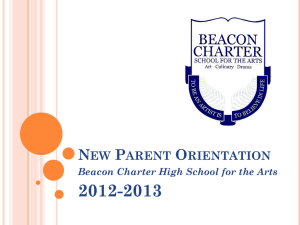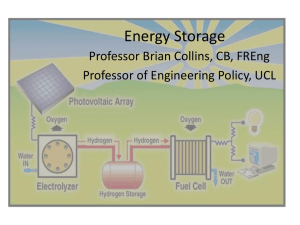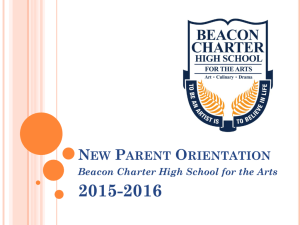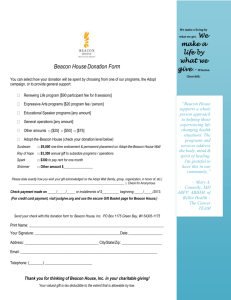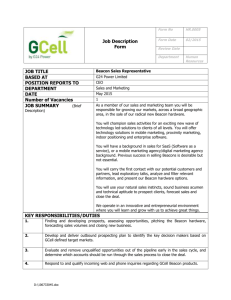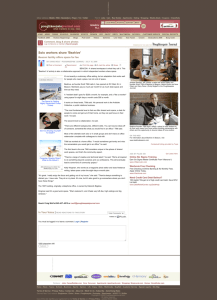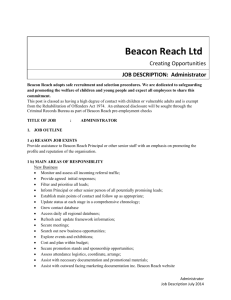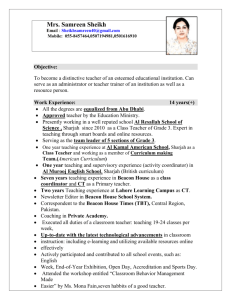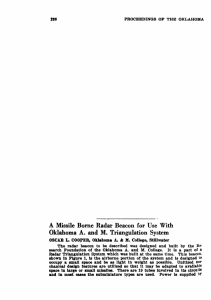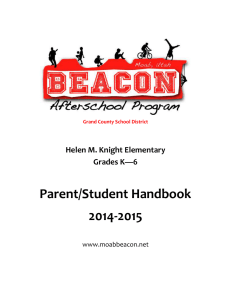New Parent Orientation - Beacon Charter High School for The Arts
advertisement
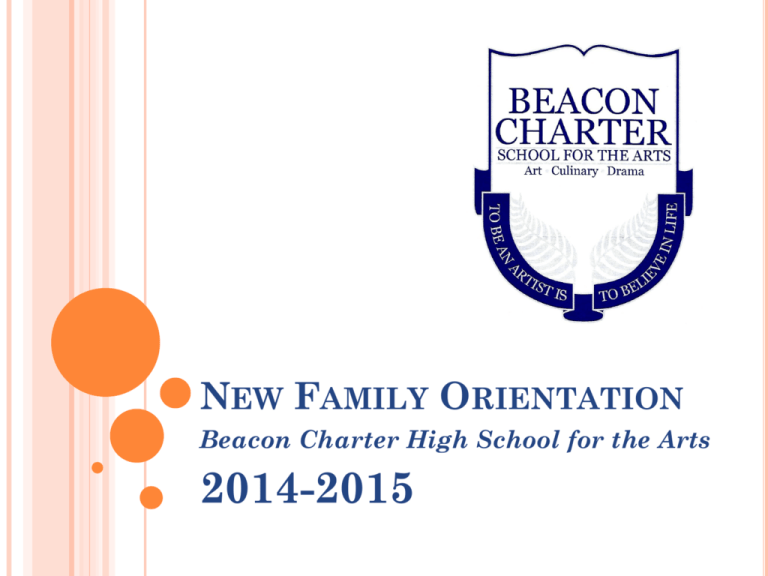
NEW FAMILY ORIENTATION Beacon Charter High School for the Arts 2014-2015 OBJECTIVES FOR THIS ORIENTATION Meet members of the school’s administration and their roles Become acquainted with the school’s history Learn about the school’s organizational structure Learn about the school’s academics and testing Have opportunities to ask questions and have concerns addressed (mainly student support issues) ADMINISTRATION Michael Skeldon, Ed.D. – Principal Overall school leadership, strategic planning and vision, fiscal management, Department of Education and Board relations, employee oversight, lobbying and public voice and ultimate compliance responsibility. Has previously served as history, film, and capstone teacher as well as Academic Dean. Eleventh year. Tina Go – Admissions and Family Engagement Oversee recruitment and admissions process, liaison with parents and outside agencies regarding student life (transportation, Federal lunch program, crisis management, neighborhood partnerships) and works in close conjunction with the Dean of Students and main office staff. Mrs. Go is a founder of the school. ADMINISTRATION, CONT. Robin Murphy – Dean of Students College planning, scheduling, report cards, transcript analysis and generation, data reporting, student discipline. Twelfth year at Beacon. Nicole Rattay – Academic Dean Faculty leadership and professional development, curriculum oversight, academic calendar development, testing administration, test data analysis, Capstone and portfolio implementation. First year with the school. ADMINISTRATION, CONT. Patricia Hawkridge, MFA – Dean of the Arts Oversees the three artistic cohorts at Beacon, creates linkages between arts and academics for students, professional development for teachers, and workshops/classes for adults including parents; serves as curator, archivist and chief exhibitor. Sixth year on staff. Eleventh year involved with Beacon. Jennifer Connolly, Ph.D. – Director of Special Education Special education compliance, state reporting, inclusion teacher assignments, coordinating with regular education teachers regarding accommodations and modifications, IEP renewal process, secondary transition and parent involvement through the Local Advisory Committee. Second year at the school. PARENT ENGAGEMENT Flo Stevens – Chair of the Parent-TeacherStudent Association (PTSA) There are many ways parents can be involved in the school: Join the PTSA Committee work: SIT, LAC, Board of Trustees Attend workshops Volunteer at the school (traditional activities such as field trip and dance chaperones, spaghetti dinner type events, or supporting an after school club) Attend the parent-teacher conferences, Arts Nights, plays, gallery nights, and film festival A LITTLE SCHOOL HISTORY … Started in 2003 by the late Jack Lawhead to Bring Educational Alternatives to the Community through Occupational Nurturing. Tenth charter school to open in Rhode Island in 2003 Closed by the state in spring 2005 Re-opened by the state Board of Regents in September 2005 Moved to 320 Main Street in 2006 Have grown from 114 students in 2005 to 225 students in 2012. Became the first “district” in Northern RI to obtain a Regent’s approved PBGR diploma, 2008 US News and World Report “Best High Schools” list in 2008, 2009, 2012, 2013, and 2014 CURRENT STATUS Just finished the ninth fiscal year in a row with a surplus from both an accrual and cash standpoint. At capacity with regard to the student body and now utilize 100% of the facility. Purchased this facility in 2011 Charter renewed in 2012 by the Board of Regents through 2018 Single greatest improvement in state testing results of any school at any level, 2007-2012 Received “Commended” status in 2014, the highest rating possible by the RI Department of Education ORGANIZATIONAL STRUCTURE Governance – Board of Trustees with higher education officials, parents, nonprofit and for profit business representatives and arts organization representatives Administration, faculty and staff – very similar to a regular district or public school (certified, highly qualified instructional staff, in state pension fund, pay prevailing wage but non-union) School Improvement Team (SIT) – the most important “committee” of all. SIT action determines new policies, initiatives and programs and makes recommendations to the Board for adoption of those policies and programs BEACONART.ORG Please, become acquainted with … www.beaconart.org & www.facebook.com/beaconart Primary tools for communication and distribution of resources needed to succeed at Beacon. By the start of school the site will be updated with new information, handbooks and calendars for the 2014-2015 school year. The site contains information on curriculum, faculty and board biographies, colleges that have accepted our students, a calendar of events updated constantly, links to our Facebook, Digication, and PowerSchool resources. COURSEWORK 34 courses needed to graduate … 8 Art 4 Math (year-long) 4 English (year-long) 4 Science 3 History/Humanities 2 Foreign Language 2 Capstone 2 Health/Physical Education 2 Computers/Business 3 Additional Courses from: -English, History, Math, Health, Foreign Language, Art, or Science This program of study meets or exceeds state guidelines and has the proper courses in the proper sequence to allow any student to attend any postsecondary institution. See beaconart.org for a complete list of postsecondary schools that have accepted Beacon graduates All teachers have aligned their courses to the RI Grade Span Expectations and/or the new Common Core Standards All teachers provide a syllabus and use the same grading formula (percentages) ASSESSMENTS STAR, NECAP, and PARCC STAR Assessments – given several times over the course of four years to track the longitudinal growth of each student, monitoring their progress towards achievement of Common Core Standards. ASSESSMENTS, CONT. New England Common Assessment Program (NECAP) No longer given. Last year, Beacon had state-leading scores in Reading and Writing. Partnership for Assessment of Readiness for College and Careers (PARCC) Beginning with the class of 2016, students are being taught using Common Core Standards and will be assessed with the PARCC test scheduled to be administered during the 2014-2015 school year. ASSESSMENTS, CONT. At Beacon there are two semesters with five courses each. Math and English are year-round courses, but all other courses are completed within the semester. Additionally, there is an advisory period and a Drop Everything and Read (DEAR) program in place. Grades are issued on a quarterly basis. Grades are updated regularly on PowerSchool. Parents and students have 24/7 access to grades. Report cards are only mailed upon request to the guidance office. PERFORMANCE BASED GRADUATION REQUIREMENTS (PBGRS) Beacon uses the portfolio and capstone project to meet these requirements. Our portfolio requirement is through a Digication website that is customized for Beacon. The link to the Beacon portal can be found at www.beaconart.org. Even if it’s true that there is no homework that night (and it rarely is true) a student can always be working on their Digication site. Students present their portfolio at the end of each school year. This is a requirement in order to be promoted to the next grade. CAPSTONE Our senior project is done through a yearlong course in Film studies and filmmaking. Each student writes, produces, directs, shoots, edits and presents a short (approximately10 minute) film. Some films are very literal and others are very metaphorical. The storytelling vehicle (plot, characters, etc.) is the student’s choice, however, the process is very structured, 100% digital, relies on students’ understanding and adhering to deadlines and is high stakes and a true “learning stretch.” We are extremely proud of this program and are continually amazed at the depth of the student’s work, the best of which is showcased at the Capstone Film Awards held each year the night before graduation. ACADEMIC SUPPORTS Strong Special Education Department and Guidance Office to support student artists with IEPs or 504 plans Response to Intervention (RtI) program to monitor student performance data in all classes Academic Dean supporting teachers as they work to increase rigor across the curriculum, ensuring that they are able to reach all students Q AND A What needs to be clarified? What other questions do you have? Mrs. Go: Transportation, Application Issues, Lunches Mrs. Murphy: Transcripts, Student Behavior, Guidance Dr. Connolly: Special Education Ms. Rattay: Academics Dr. Skeldon: Other Issues
